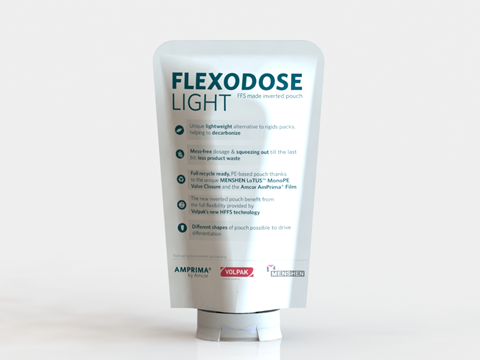
Volpak, Amcor, and Menshen have revealed a lightweight, mono-PE inverted pouch format designed for recyclability and reduced carbon emissions compared to rigid bottles.
The FlexoDose Light pouch is made entirely from mono-material polyethylene, including the film from Amcor and the closure system from Menshen. As such, it is said to be fully recyclable and compliant with both plastic waste reduction initiatives and Extended Producer Responsibility obligations.
Compared to rigid bottles, the pack’s lightweight handling and compact storage are believed to offer a ‘significantly’ lower carbon footprint in the manufacturing and transportation process while also saving space in a consumer’s home.
At the same time, it is designed to maintain the same standard of functionality and visual appeal. Its self-standing, angled, wedge-style structure is intended to enhance the pouch’s on-shelf presentation.
The inclusion of Menshen’s Lotus cap is also set to facilitate controlled dispensing, prevent spillages with reliable sealing, and avoid product waste by allowing consumers to empty the pack to the last drop. This is hoped to unlock on-the-go applications as well as at-home uses.
The pouch has potential applications in the food, home care, and personal care industries. Among its suggested use cases are yoghurts, sauces, condiments, shampoos, conditioners, lotions, detergents, surface cleaners, and refillable concentrated liquids.
Reportedly, inverted pouches already hold over 30% of the condiment and home care refill markets in North America and parts of Asia – and the global inverted pouch market, valued at around $12.8 billion USD in 2025, is projected to grow at a 7.7% CAGR into 2033.
Volpak adds that FlexoDose Light is compatible with its SI and SP series HFFS platforms. It suggests that customers can implement the new format into their production lines without significant redesigns or operational disruption.
The development comes as Amcor and Mediacor launch a ‘recycle-ready’ spouted stand-up pouch for Nana-brand liquid products. Compared to two 1L bottles made of blow moulded PET, this solution has apparently reduced the plastic used to package 2 litres of product by up to 80% and lowered the carbon footprint of its packaging by up to 64%.
ProAmpac and ScottsMiracle-Gro have also implemented a spouted refill pouch for the Ortho Home Defense Max pest control product; it is said to utilize 90% less plastic, reduce the pack’s overall weight, and optimize the pack for e-commerce applications, all without reducing the amount of liquid in the pack.
If you liked this story, you might also enjoy:
The ultimate guide to the Packaging and Packaging Waste Regulation in 2025
How are the top brands progressing on packaging sustainability?
Everything you need to know about global packaging sustainability regulation in 2025
The key to increasing the use of reusable packaging in supermarkets














No comments yet